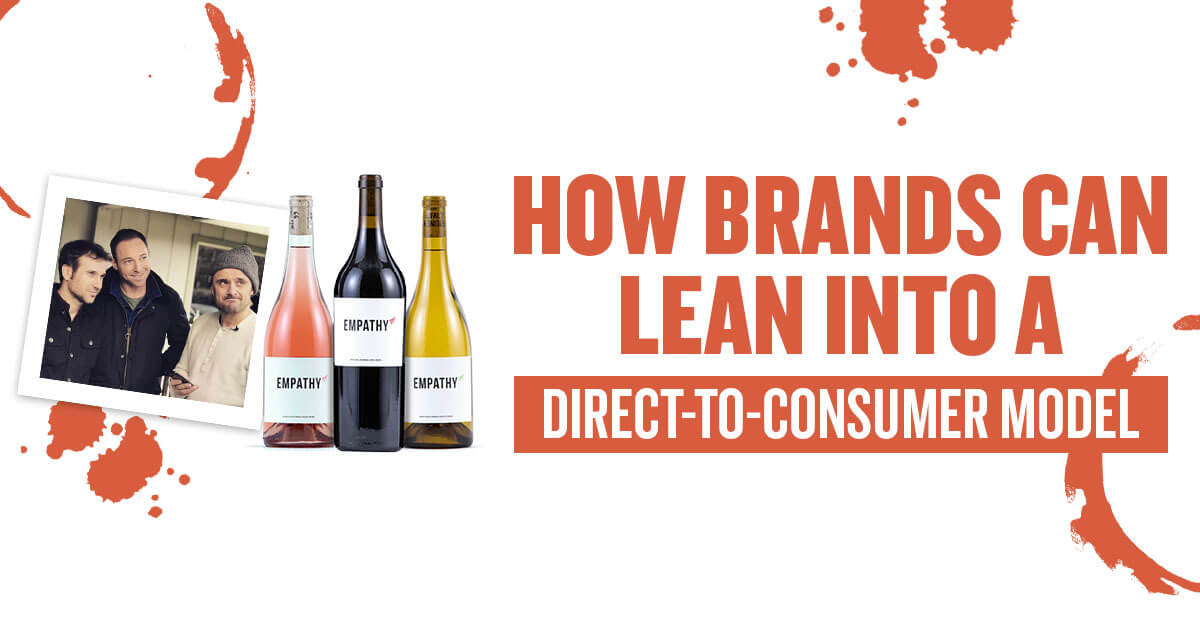When I spent my 20s working in my family’s liquor store, I saw from the inside how the wine industry operates.
There are a lot of layers in the wine world — wineries, distributors, retailers — people who handle the wine before it actually gets to you.
Which means, consumers end up paying more than they could. What’s unique about the wine industry is that because of the law changes when prohibition was repealed, there is an extra layer in each state of a distributor that doesn’t exist in many other consumer brands which adds to the cost of products on the shelf.
On the flip side, I’ve been fascinated by what companies like Warby Parker have done with glasses, and what Lola has done in women’s personal care — operating from a place of wanting to give the best value to the end consumer.
It’s why we started Empathy Wines – a direct-to-consumer (DTC) wine company that was recently acquired by Constellation Brands.

In this article, I’ll talk about some of the things we learned, what I think we did well, and where we’re hoping to go in the future. Hopefully this brings value to other brands & businesses starting to lean into DTC.
Why Direct-to-Consumer has become very important
Adding a DTC model is more important for brands than ever – especially as we adapt to a world of COVID-19.
According to ShipCompliant, DTC shipments in March 2020 rose +18% on dollars vs. the year prior. March 2020 shipment levels were in the range of what would be typically sold during the typical highest selling months of October and November.
That was after people just started adapting their day to day lives to COVID. So imagine where I think this is really going.
The world was moving towards direct-to-consumer anyway, COVID just accelerated it because people got forced into new behaviors. Now that people have had a taste, it’s going to be very hard to “wean them off” of the convenience, price power, and enjoyment of e-commerce buying. It doesn’t mean that people aren’t going to go to stores anymore (that would really upset my dad ;)), it just means that a lot of consumers have added e-commerce into the mix or that e-commerce is now a bigger percentage of their overall activity.
This isn’t something that just lasted for a few weeks – we’ve been in this new mode for months. People’s behaviors have changed, and it’s important for brands to adapt.
For example, with Empathy Wines, we are overdelivering massively on the $20 price point that we position the wine in.
To build a DTC brand, creating an authentic story is key
Like everything else, Empathy Wines was built as a brand. What was cool is that it really was a true, authentic execution. I talked about how the brand that was best for the farmer and best for the consumer would always win – which is what we did.
We built it with a consumer-first focus, and let the consumer impact the strategy. Empathy had a mission of delivering great $20 wine to people, and it had a mission of putting the farmers front and center by putting them on the back of the label. We story told around them with the hope that it would build their brands and their farms to allow them to sell grapes for higher prices.
We used our marketing platform to build them up with the hope that it would impact them in a positive manner.

Think about where 1+1 = 11
I’m super excited about Empathy Wines’ partnership with Constellation Brands because I think Empathy could become one of the most significant wine brands in the world as a result of this partnership.
This accelerates the growth – the infrastructure that Constellation brings to the party is meaningful from the quality of grapes to the winemakers to the facilities. The quality of the wine goes up in this partnership. We were already able to deliver a really high quality wine at a great price, I think this allows us to take it to the moon. It puts us in an even better position with their buying power and vineyards. That really excites me because that’ll continue to drive it, along with the marketing and branding firepower that we’ll continue to bring.
Let there be no mistake – for as nice of a community as I have, for as much notoriety as I have, this was not an influencer marketing execution. This was an extremely strong product with a contemporary, modern, media execution.
Constellation is a global company with a senior executive team which I love. I’m completely convinced that Empathy has the potential to become an even more delicious $20 bottle of wine because of this.
One thing that’s difficult about it is that I’m not really about selling businesses – but I am about “1+1 = 11.” That’s what this is. What that means to me is, occasionally in a career, you can see where two parties come together and the magnification is far greater than the sums of the parts. This is absolutely one of those rare occasions in my career.
Constellation’s mass infrastructure allows Empathy to win bigger than without them. We probably left some money on the table by selling this early, but I also think it’s a huge outcome for Nate and Jon (my partners), and for my investors.
I also think one of the major reasons Constellation was interested in this deal was how we could impact their other brands.
Sometimes you’ll bring in a player on a sports team who’s on the back end of their career physically, but they’re such a good leader that the intangibles they bring to the locker room changes the outcome of the team. I see it that way – hopefully we’re not at the tail end of our ability, but we bring a certain energy and capability and DNA / nuance that resonates.
I don’t want to speak for Constellation on every point, but I’d be flabbergasted if this wasn’t one of the reasons why this deal was interesting for them.
It was the right decision at the right time.












sildenafil over the counter: buy viagra online – Generic Viagra for sale
https://fastpillsformen.com/# Viagra tablet online
buy erectile dysfunction treatment: fast pills easy – erectile dysfunction medication online
Viagra online price: cheap viagra – Viagra tablet online
pills for ed online cheap cialis buy erectile dysfunction pills
http://fastpillseasy.com/# pills for ed online
cialis for sale: MaxPillsForMen – buy cialis pill
slot oyunlar? puf noktalar? slot casino siteleri slot siteleri
http://sweetbonanza25.com/# sweet bonanza slot
http://denemebonusuverensiteler25.com/# deneme bonusu veren siteler
deneme bonusu veren casino siteleri: casino bahis siteleri – Deneme Bonusu Veren Siteler
https://casinositeleri25.com/# bilinmeyen siteler
yat?r?ms?z deneme bonusu veren siteler: deneme bonusu veren siteler – yeni deneme bonusu veren siteler
https://denemebonusuverensiteler25.com/# deneme bonusu veren yeni siteler
sweet bonanza demo oyna sweet bonanza sweet bonanza yorumlar
http://casinositeleri25.com/# casino bahis siteleri
https://casinositeleri25.com/# deneme bonusu veren siteler 2025
en cok kazand?ran slot oyunlar?: az parayla cok kazandiran slot oyunlar? – az parayla cok kazandiran slot oyunlar?
deneme bonusu veren casino siteleri canl? casino siteleri casino
deneme bonusu veren siteler: yeni deneme bonusu veren siteler – yeni deneme bonusu veren siteler
https://slotsiteleri25.com/# slot oyunlar? puf noktalar?
denemebonusuverensiteler25: deneme bonusu veren yeni siteler – yeni deneme bonusu veren siteler
deneme bonusu veren casino siteleri en Г§ok kazandД±ran bahis siteleri casino bet giriЕџ
http://sweetbonanza25.com/# sweet bonanza yorumlar
deneme bonusu veren yeni siteler: deneme bonusu veren siteler – deneme bonusu veren siteler yeni
denemebonusuverensiteler25: deneme bonusu veren siteler yeni – deneme bonusu veren siteler
sweet bonanza sweet bonanza oyna sweet bonanza guncel
Với công nghệ bảo mật đa tầng, Rbviet.net Rbesports cam kết bảo vệ thông tin người chơi, giao dịch an toàn, nhanh gọn và mang đến trải nghiệm cá cược công bằng. – 2025 March 28, 14:55
Đồng hành cùng Rayesports.com Rayesports, khám phá nền tảng cá cược esports tiên tiến với tỷ lệ cược cạnh tranh cho các tựa game hot như League of Legends, CS:GO, Dota 2, Valorant… – 2025 April 04, 10:05
Đặt cược esports an toàn, dễ dàng tại Rbviet.net Rbviet, nền tảng chuyên nghiệp với công nghệ bảo mật hiện đại, đảm bảo giao dịch nhanh chóng và minh bạch. – 2025 April 11, 10:00
Профессиональный сервисный центр по ремонту бытовой техники с выездом на дом.
Мы предлагаем:сервис центры бытовой техники москва
Наши мастера оперативно устранят неисправности вашего устройства в сервисе или с выездом на дом!